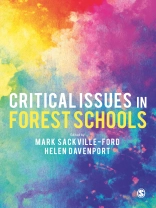Forest School continues to grow and develop, both in the UK and internationally. Literature and research in the field tend to document this growth, while this book takes a novel approach to the Forest school conversation, taking a critical look at the various tensions and difficulties that surround Forest School practice.
The editors, together with chapter authors drawn from the fields of academia and practice, form an experienced voice, encouraging the reader to reflect upon, question and explore complex areas of Forest School practice.
Jadual kandungan
Part I: Mapping the Territory
Chapter 1: When Forest School isn′t Forest School – Mel Mc Cree
Chapter 2: Challenge and compromise at Forest School – Helen Davenport
Chapter 3: What does ′long-term′ mean at Forest School? – Mark Sackville-Ford
Chapter 4: Forest School and progressive forms of education – Mark Sackville-Ford
Part II: Navigating the ethos
Chapter 5: Rethinking praise and competition at Forest School – Mark Sackville-Ford
Chapter 6: Reflecting on multiple intelligences and learning styles – Mark Sackville-Ford
Chapter 7: Behaviours that challenge at Forest School – Mark Sackville-Ford
Chapter 8: A voice in the Forest – Helen Davenport
Chapter 9: A School Perspective of Forest School – Elizabeth Irvin
Part III: Furthering Practice
Chapter 10: Transitions at Forest School – Leanne Connelly
Chapter 11: Identities and genders at Forest School – Mark Sackville-Ford
Chapter 12: The Impact of Fire at Forest School – Kelly Francis Horrocks
Chapter 13: How safe is Forest School? – Lily Horseman
Chapter 14: Aspects of training: a conversation – Lily Horseman & Mark Sackville-Ford
Mengenai Pengarang
Helen Davenport has worked in the Early Years sector for twenty years, as a Foundation Stage Leader, Deputy Head and currently as a Senior Lecturer at Manchester Metropolitan University in Childhood Studies. She has previously been engaged in research that explores the nature of students′ reflective writing and young children′s talk and ′chatter′. Helen is passionate about the benefits of outdoor learning and Forest School and enjoys taking her Early Years students to Forest School sessions and enabling them to experience this approach first hand. Her current academic interests include the pedagogies and practices that stem from Forest Schools, with a particular curiosity about practitioner experiences of leading sessions and how these outdoor spaces might support children’s talk.











